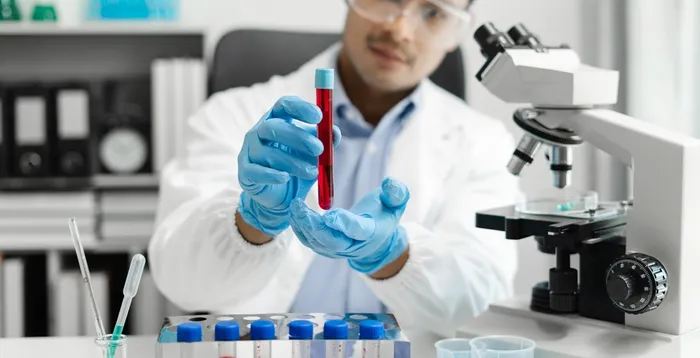Blood tests are one of the most effective ways to monitor your overall health. They provide insights into how your body is functioning and help detect potential health issues before they become serious. Whether you’re looking to track key markers like cholesterol or evaluate organ health, routine blood tests are a vital part of preventive healthcare.
Here are the 5 essential blood tests everyone should consider for regular health monitoring.
1. Complete Blood Count (CBC):
What It Is?
A Complete Blood Count (CBC) measures the levels and quality of red blood cells, white blood cells, and platelets in your blood.
Why It’s Important?
- Red Blood Cells: Check for anemia or other conditions affecting oxygen transport.
- White Blood Cells: Identify infections, inflammation, or immune system disorders.
- Platelets: Evaluate clotting ability to prevent excessive bleeding or clotting disorders.
Key Indicators:
- Hemoglobin and hematocrit (oxygen-carrying capacity).
- White blood cell count (infection detection).
- Platelet count (blood clotting).
Who Should Get It?
- Everyone, especially individuals with symptoms like fatigue, infections, or unexplained bruising.
2. Lipid Profile (Cholesterol Test);
What It Is?
A lipid profile measures your cholesterol levels and triglycerides to evaluate your cardiovascular health.
Why It’s Important?
High cholesterol can lead to a buildup of plaque in the arteries, increasing the risk of heart disease and stroke.
Key Indicators:
- Total Cholesterol: Overall cholesterol level in your blood.
- LDL (Low-Density Lipoprotein): Known as “bad” cholesterol; high levels increase heart disease risk.
- HDL (High-Density Lipoprotein): “Good” cholesterol that helps remove LDL from the bloodstream.
- Triglycerides: Fat in the blood that can increase the risk of heart disease when elevated.
Who Should Get It?
- Adults over 20, at least every 5 years; more frequently for those with risk factors like obesity or family history of heart disease.
3. Blood Glucose Test:
What It Is?
A blood glucose test measures the amount of sugar (glucose) in your blood to detect diabetes or prediabetes.
Why It’s Important?
High blood sugar levels can lead to diabetes, while low levels may indicate hypoglycemia. Early detection of irregularities can prevent complications like nerve damage, kidney disease, and heart problems.
Key Indicators:
- Fasting Blood Glucose: Evaluates sugar levels after an overnight fast.
- HbA1c Test: Measures average blood sugar levels over the past 2–3 months.
Who Should Get It?
- Individuals over 45 or those with risk factors like obesity, family history of diabetes, or high blood pressure.
4. Liver Function Test (LFT):
What It Is?
A Liver Function Test (LFT) evaluates the health of your liver by measuring enzyme levels and other markers.
Why It’s Important?
The liver plays a critical role in detoxifying the body, metabolizing nutrients, and producing essential proteins. Monitoring liver health can help detect conditions like fatty liver disease, hepatitis, or damage from alcohol or medication use.
Key Indicators:
- ALT (Alanine Aminotransferase): Elevated levels may indicate liver damage.
- AST (Aspartate Aminotransferase): High levels may signal liver or muscle damage.
- Bilirubin: Excess bilirubin can indicate liver or bile duct issues.
- Albumin: A protein made by the liver; low levels may suggest liver dysfunction.
Who Should Get It?
- Individuals with symptoms like fatigue, jaundice, or abdominal pain, or those with a history of heavy alcohol use or medication that affects the liver.
5. Kidney Function Test:
What It Is?
A Kidney Function Test assesses how well your kidneys are filtering waste and maintaining fluid and electrolyte balance.
Why It’s Important?
Healthy kidneys are essential for removing waste, balancing minerals, and maintaining blood pressure. Early detection of kidney issues can prevent chronic kidney disease (CKD) or kidney failure.
Key Indicators:
- Creatinine: High levels indicate reduced kidney function.
- Blood Urea Nitrogen (BUN): Measures waste products in the blood.
- eGFR (Estimated Glomerular Filtration Rate): Evaluates how efficiently your kidneys are filtering blood.
Who Should Get It?
- Individuals with diabetes, high blood pressure, or a family history of kidney disease.
Why Routine Blood Tests Are Essential?
- Early Detection
Blood tests can identify health issues before symptoms arise, allowing for prompt intervention. - Disease Prevention
Tracking key health markers helps prevent chronic conditions like diabetes, heart disease, and kidney disorders. - Personalized Health Management
Regular testing allows you and your doctor to tailor treatments or lifestyle changes to your specific needs. - Monitoring Changes Over Time
Annual blood tests provide a baseline for tracking health trends and detecting changes.
How to Get These Blood Tests in the UK?
NHS Health Checks
- Adults aged 40–74 are eligible for free health checks every 5 years, which include basic blood tests.
Private Clinics
- Private healthcare providers offer comprehensive blood test packages with faster results and advanced diagnostics.
GP Consultation
- Discuss your symptoms or concerns with your GP, who can recommend appropriate tests.
Final Thoughts
Blood tests are a simple yet powerful tool for monitoring your overall health. From assessing organ function to evaluating heart and diabetes risk, these essential blood tests provide a comprehensive overview of your well-being. By scheduling routine blood tests, you can stay proactive about your health, detect potential issues early, and enjoy a healthier, longer life.
Don’t wait for symptoms to appear—make blood tests a regular part of your health monitoring routine. Consult your healthcare provider to determine the best schedule for your needs.



